How Long Can A Frog Live In A Pool? (Find Out Now!)

Frogs are not the first thing people think of when they are about to become a pool owner. However, they can prove to be a bit of a pest for people in certain parts of the country. When frogs see your pool, they’re going to want to hop in. Unfortunately, chlorine and pool water isn’t good for them. How long can they survive in it?
Frogs generally cannot survive more than two days in a pool at a maximum. They usually drown when they try to escape. If a frog lays eggs in a chlorine-rich pool, the eggs usually will not hatch. If you have tadpoles, you have to get rid of them immediately.
Having frogs in your pool might seem cute at first, but it’s a major health hazard. It can also end up harming your pool equipment. It’s time to talk about what’s going on here.
Why Do Frogs Die In Pools?
Frogs naturally live in water, but that does not mean they live well in chlorinated water. They need natural water to survive and thrive. Pools are often quite deadly for frogs, but how the pool hurts them depends on chlorine levels, salt levels, and whether they can get out.
Why They Die In High-Chlorine Water
In high-chlorine water, frogs die because the chlorine and other chemicals eats away at their skin. This basically makes them “choke out” and turn into a bleeding rashy frog that drowns as it gets weaker. This is also why frog eggs do not usually hatch in pools.
Why They Die In Low-Chlorine Water
If your pool is low-chlorine, they could be dying because they can’t escape the water. Like all amphibians, they do occasionally need to get to dry land so that they can eat and do other frog things. In this case, your frogs might end up dying of starvation.
If you want to prevent frogs from dying from in your pool, you can do it as long as it’s a low-chlorine pool. Just add a small ramp so that frogs can leave when they realize they don’t want to stay in the water.
How Do Frogs Harm Your Pool?
There are several ways they can harm your pool. A dead frog can clog your pool skimmer and plumbing, not to mention pose a major threat to your health. You will need to shock your pool if you find a dead frog or frog eggs in your pool. If a frog lays eggs, it can also harm your pool’s vacuum and plumbing. It’s just not good!
Every time you have a frog that dies in your pool, you have to shock your pool and make sure no parts of the frog are left stuck there. Depending on what happened to it, you might actually have to call a pool repairman. It’s not a good look.
How Do You Prevent Frogs From Entering Your Pool?
An ounce of prevention is worth a pound of cure. Here’s what you can do to help keep froggies at bay:
- Clear out clutter and debris from your lawn. Frogs like to hang out in leafy areas, so it’s best to keep your yard manicured to avoid attracting them.
- Consider spreading a little salt near your pool. Raw salt burns frogs’ feet and skin. A little sprinkling of salt is usually enough to deter curious frogs from going too close to a pool that could hurt them.
- Spray citric acid or lemon juice in the drain pipes. Frogs hate the smell of citric acid and it burns their feet too. Spraying it will keep them away from drain pipes—another major hangout spot for amphibian buddies.
- Insist on using a pool cover. If you keep the pool uncovered at night, most frogs will find that to be an open invite for a swim they may not be able to survive. A pool cover will keep your pool warm and also help prevent them from dying in your pool.
- Don’t leave pet food out at night. Some folks have reported seeing frogs eating from their pet’s food bowl late at night. While this is not the norm, it’s still something to consider. Open food attracts all kinds of pests.
- Have a fence installed around your pool. Obviously, frogs can jump so this is not always useful. However, a solid, gap-free fence that’s the standard height for pools is more than enough to prevent some frogs from jumping in.
Related Questions
What should you do if you believe frogs laid eggs in your pool?
If you see cloudy buildup during the earlier to middle portion of summer, be careful! That might be frog eggs in your pool. If you suspect a frog has laid eggs in your pool, remove the eggs with a net immediately. The longer you wait, the more likely they are to hatch and the more difficult your pool will be to clean.After you have removed the eggs, you need to give your pool a very thorough cleaning, followed by a shock treatment. Make sure the sides don’t have residue!
Do frogs carry diseases?
One of the reasons you should never be okay with having frogs enter your pool deals with the diseases they can carry. They have a tendency of carrying diseases like salmonella as well as a number of parasites. While chlorine is supposed to kill these pathogens, it’s possible to overwhelm your pool’s system if frogs stay there in large quantities.
Can frogs bite you?
Another good reason why you might not want to have frogs hopping in your pool deals with the risk of bites. While most frogs and toads will not bite people, some do. In fact, some actually enjoy the sensation of chomping on you. Pacman Frogs are most commonly associated with their love of biting.While bites rarely hurt, if they break skin, they can get you sick. If you find a frog in your pool, use a net to scoop it out and toss it into your yard.

Ossiana Tepfenhart is an expert writer, focusing on interior design and general home tips. Writing is her life, and it's what she does best. Her interests include art and real estate investments.
More by Ossiana Tepfenhart



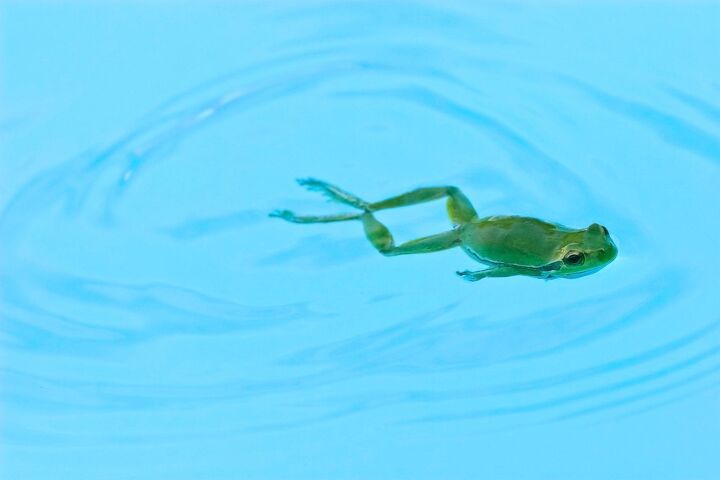






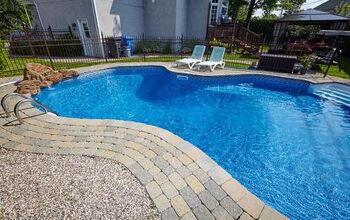
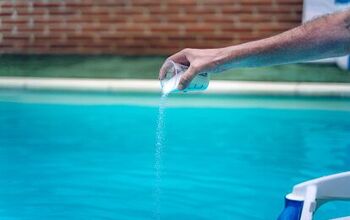
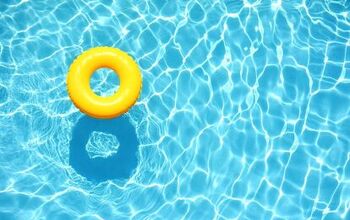
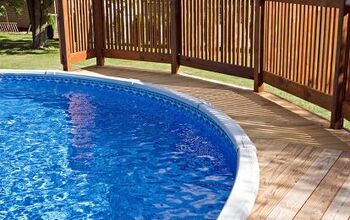
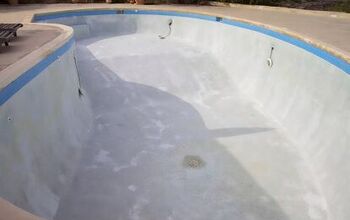









![Standard Dining Room Table Dimensions [for 4, 6, 8, 10 and 12 People]](https://cdn-fastly.upgradedhome.com/media/2023/07/31/9074335/standard-dining-room-table-dimensions-for-4-6-8-10-and-12-people.jpg?size=350x220)


